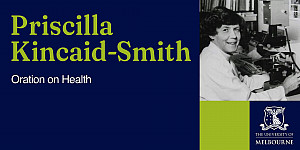2025 Priscilla Kincaid-Smith Oration on Health - International Women’s Day
Open gallery

Contact email
Further information
Monica Duggan
monica.duggan@unimelb.edu.au
Share
Professor Mahzarin Banaji, a world renowned social psychologist from Harvard, has shaped our understanding of human behaviour through her research on implicit bias - the unconscious attitudes that influence our decisions and interactions. Her work examines how these hidden preferences affect both individual choices and broader societal patterns. Following the keynote address, research psychologist Dr Amy Loughman research psychologist, Senior Research Fellow and Head of the Microbiome Research Stream at the Food & Mood Centre will join Professor Banaji to facilitate a Q&A to delve into the impact of her research on healthcare delivery and patient outcomes.
The Priscilla Kincaid-Smith Oration on Health honours the life and work of Professor Priscilla Kincaid-Smith AC CBE, and the impact clinician scientists have on health in society. More information on Priscilla Kincaid-Smith here.
Presenters

World renowned social psychologist from Harvard
Blindspot: Hidden Biases of Good People, Mahzarin R. Banaji, Richard Clarke Cabot Professor of Social Ethics, Department of Psychology, Harvard University
All humans genuinely intend to obey the virtues of accuracy and fairness, but research from experimental psychology has consistently challenged the possibility that we, in fact, do so. We have learned that our actions can be inconsistent with our values – obstructing the very goals to which we are consciously and even passionately committed. A striking example of this state of affairs is that even if conscious prejudice/animus is genuinely absent, behavior can be disjointed from values of accuracy and fairness because of implicit bias (a term to emerge from our lab in the early 1990s, and that has now entered the vernacular).
“This lecture will focus on the surprising and even perplexing manner by which implicit bias operates. By walking the 40-year research path of my lab, I will elucidate how I came to understand what implicit bias is, its role in shaping life’s opportunities and outcomes and reactionary challenges to it; as well, an optimistic result I did not expect to encounter in my lifetime – that even implicit (hidden) biases are reliably and at times rapidly moving toward neutrality. I will touch on the signature behavioral result of dissocation and association between explicit and implicit cogntion, the neural underpinnings of implicit bias, its development from childhood into adulthood, its malleability, its power to predict socially significant outcomes in the domains of health, education, employment and legal treatment at the regional level. I will point to new research on the manifestation of bias in large language corpora and in LLMs today. The overarching call of this work is a simple one: to deeply understand implicit cognition so that we can do what we have done, as a species, so many times before in our history: to outsmart the limits of our own minds to ensure that our consciously held values are transduced into a more praiseworthy world.” Professor Banaji




